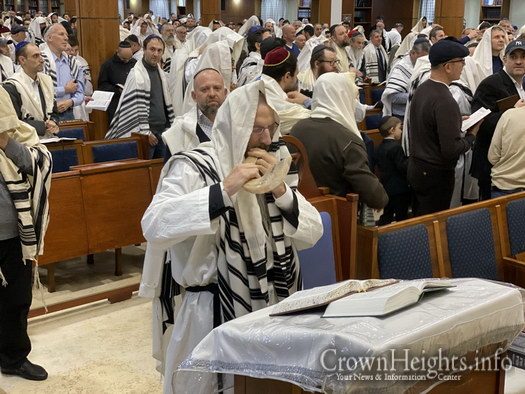
Weekly Dvar Torah: Why The Cry?
On Yom Kippur, and before that on Rosh Hashana, there is a central prayer, called ונתנה תוקף = u-ne-sa-ne to-kef, proclaiming the mighty holiness of the day, crowning G-d as King, declaring G-d’s awesomeness as He runs the world.
We continue to describe how G-d gets involved in every detail of His subjects to the minutest detail, and how on this day G-d judges the world, who will live, who will be born, who will live in peace, etc.
It’s the day of judgement, the mighty king lays out the plan for the New Year.
The end of the prayer is chanted loudly and lively by the entire crowd; ותשובה ותפלה וצדקה מעבירין את רוע הגזירה = Repentance, Prayer and Charity, eliminate the harshness of the decree.
This prayer is the most solemn prayer of the day, on Rosh Hashana and on Yom Kippur.
Analyzing this prayer, one begs to ask, we are proclaiming G-d’s exalted Kingship, we are awe-inspired by G-d, and instead of getting excited by His supremacy we get excited about our mundane needs?
Granted that we must pray and ask G-d to give us a sweet year, but how does this level with G-d’s greatness, our needs are mortal and petty compared to G-d’s greatness, shouldn’t we get excited by the G-d’ly part of the prayer? How this focus and chant for our personal needs, sounds very selfish, and perhaps even inappropriate, to mix in our petty needs with G-d-almighty’s celebrated crowning day?
An age-old dilemma.
On Rosh Hashana we read the story of Chana’s intense prayer for a child in the Temple of Shiloh, where the High-Priest Eili noticed her and admonished her for that; why are you so drunk in prayer, said Eili, here in G-d’s house you should focus on G-d, not on your personal needs, you are exhibiting the wrong intensity for the wrong things!
Responded Chana; I am pouring out my soul for G-d, I need a son to serve G-d, he will do G-d’s work in this world, so my prayer comes straight from my essence to G-d’s essence, not for my personal need.
When Eili heard this, he agreed, and he blessed Chana that G-d grant her wish, and indeed Shmuel the prophet was born as a result.
Eili couldn’t see how our mundane needs are really G-d’s needs, that He wants us to use what’s ours to serve Him and make the world a better place, Eili saw a dichotomy between mans needs and G-d’s glory.
Chana, however, saw the symphony of man and G-d, she saw a synthesis in creation, there are no opposite interests here, we humans want to do G-d’s work, and we need the tools with which to perform.
We pray to G-d, we are now crowning You as king, but we need the tools with which to do Your work, we need You to supply us with all our needs so that we can live in peace and do Your work without disturbances, please enable us to crown You King, and keep Your world to be Yours.
So in this solemn prayer, we chant loudly and lively; G-d we want to serve You as our king, the way we do this is through תשובה = repentance (i.e. return, be close to G-d), תפלה = prayer (i.e. connection to G-d), and צדקה = charity (i.e. justice) in this physical world, so if You will remove all the distractions, You will be the celebrated King, and the entire existence will proclaim Your glory.
When we pray for our needs, our essence to serve G-d connects with G-d’s essence to be King, and therefore our needs are indeed G-d’s needs, we are one and the same.
And on Yom Kippur we connect with G-d at our core, which is inherently part of G-d.
This Shabbos, practice the return, G-d calls out to us שובה ישראל = return to me Israel, we are invited, R.S.V.P!
Safe travels to the home Shabbos,
Gut Shabbos
Rabbi Yosef Katzman












